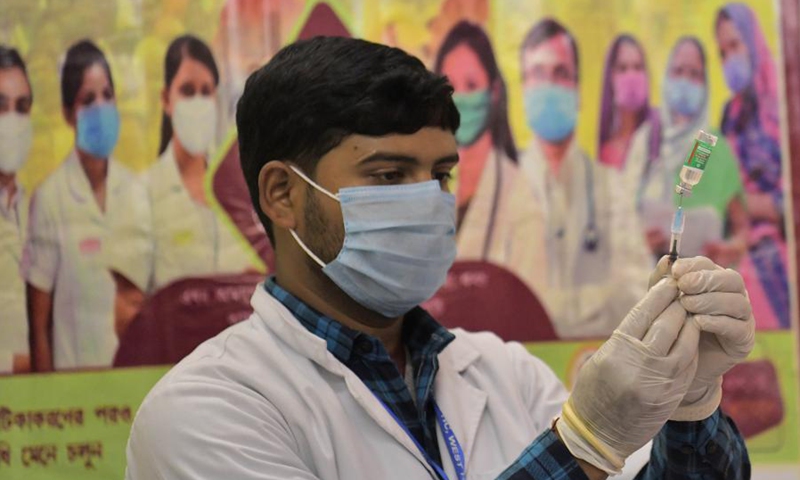India ‘100% unable’ to achieve COVID-19 vaccination goal

A health worker prepares a dose of the COVID-19 vaccine Covishield for health workers of the Border Security Force at Agartala, the capital city of India's northeastern state of Tripura, Jan. 21, 2021.Photo:Xinhua
More than 2.3 million people in India reportedly have received COVID-19 vaccinations as of Wednesday, the twelfth day since the country launched its “world’s biggest inoculation program” that plans to vaccinate 300 million population from high-risk groups by the end of July. The program is nonetheless doubted by observers, who believe the government’s poor management ability will lead to failure with its ambitious target.
India is “100 percent unable” to achieve the goal given local people’s distrust of the vaccines and possible supply shortage, Tian Guangqiang, assistant research fellow with the National Institute of International Strategy at the Chinese Academy of Social Sciences, told the Global Times on Friday.
In India, the deaths of nine health workers following vaccination in the first 12 days since the inoculation started on January 16, raising public concerns about the vaccine’s safety.
The authorities said that the deaths were not due to the vaccine, but this seemed unable to quell people’s anxiety, with India’s domestic medicine experts and media appealing to the government to “immediately disclose all details of the investigations into these serious adverse events,” reported local news site scroll.in on Thursday.
The vaccine taken in each case was Oxford/AstraZeneca’s Covishield, said scroll.in.
As a newly developed adenovirus vector vaccine, Covishield’s stability and security is relatively lower than the more mature inactivated vaccines, and it has shown more serious adverse reactions in its clinical trials, said a Beijing-based immunologist.
"It’s better for India to suspend Covishield inoculations before finding out the actual causes of the nine deaths,” the immunologist, who preferred to remain anonymous, told the Global Times Friday.
Germany has also cast doubt on Covishield. The country’s immunization commission on Thursday recommended the government only use it on people between the ages of 18 and 64, as “there was insufficient information on its effectiveness for people over 65 years old,” according to Bloomberg.
India’s self-developed COVID-19 vaccine Covaxin, also available in the country’s current domestic inoculations apart from Covishield, can hardly win people’s confidence either. Covaxin hasn’t published its Phase III clinical trial data yet.
The millions of doses of vaccine that the Indian government keeps giving to some neighboring countries as gifts also aroused concerns about a possible shortage of domestic supply, Tian noted.
United Nations Secretary-General Antonio Guterres on Thursday praised India’s “high level of production” of vaccines, reported Delhi-based newspaper Mint on Friday. The country’s largest producer Serum Institute of India (SII) told the BBC earlier this month that it could make 50 million doses a month.
The number is far from meeting the Indian government’s goal of vaccinating 300 million people by July, Tian said. The goal requires at least 600 million doses, meaning India has to produce 100 million doses per month, he explained.
"Without enough qualified domestic manufacturers, India can hardly increase its production capacity in a short period of time,” he told the Global Times.
Both India and China were recently listed by The Economist as third echelon countries in the world to achieve “widespread” vaccination coverage – meaning 60-70 percent of the adult population being vaccinated.
The two populous countries will have widespread access to the shots in late 2022, later than many developed Western countries and middle-income ones including Mexico and Brazil, said an article published by The Economist on Wednesday. Their big population sizes slow down their inoculation rollout, it said.
Tian disagreed, saying that China, with its strong implementation capacity and people’s trust and support, may achieve widespread vaccination coverage much earlier than the article predicted.
"Look at how some big Chinese cities carry out nucleic acid testing for all their millions of people within days,” he said.

